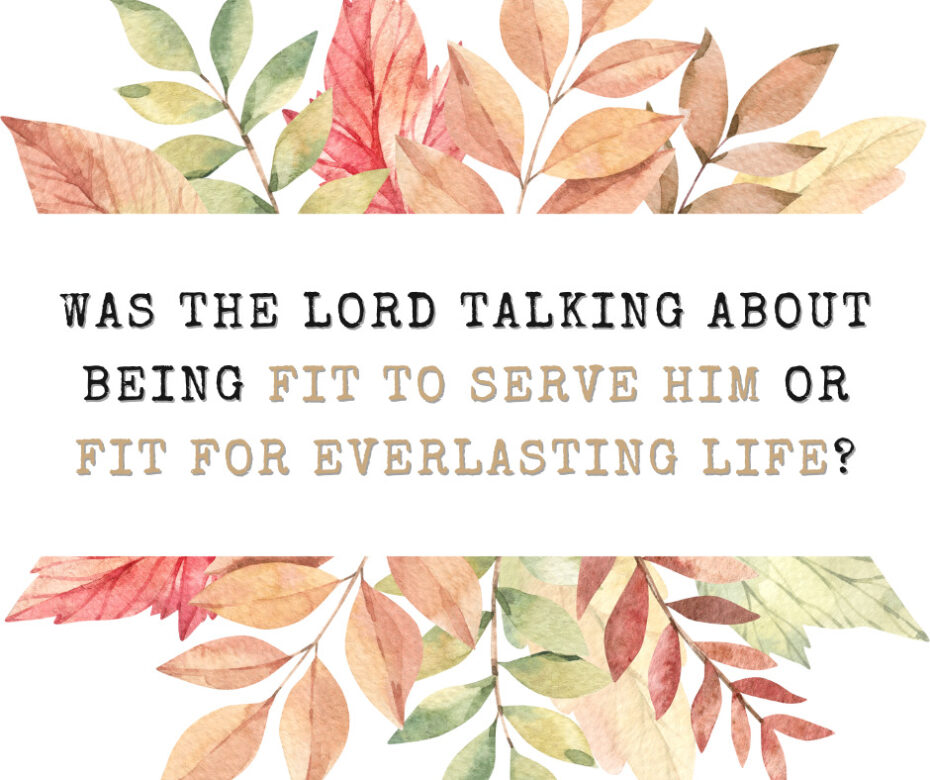This question came up in my Sunday School class yesterday. It is an excellent question.
A man came to Jesus and said, “Lord, I will follow You, but first let me go and bid them farewell who are at my house” (Luke 9:61). The Lord replied,
“No one, having put his hand to the plow, and looking back, is fit for the kingdom of God.”
Lordship Salvation advocates find in this verse proof that one must persevere in following Christ in order to gain access to Jesus’ coming kingdom. John Martin comments on Luke 9:62 that “Jesus’ message…demanded total allegiance” (Luke in The Bible Knowledge Commentary, p. 232).
Matthew Henry writes:
“Those who begin with the work of God must resolve to go on with it, or they will make nothing of it. Looking back inclines to drawing back, and drawing back is to perdition. Those are not fit for heaven who, having set their faces heavenward, face about. But he, and he only, that endures to the end, shall be saved” (Matthew Henry’s Commentary on the Whole Bible, p. 1855).
Jamieson, Fausset, and Brown write, “As ploughing [sic] requires an eye intent on the furrow to be made, and is marred the instant one turns about, so will they come short of salvation who prosecute the work of God with a distracted attention, a divided heart” (Commentary Critical and Explanatory on the Whole Bible, Vol. 2, p. 108).
Many commentators suggest that the Lord spoke of those proclaiming His saving message. Those who (like Lot’s wife) look back to the things of this world are not fit to be messengers of the kingdom of God. Many are not clear about whether the one who turns back will be eternally condemned.
Fitzmyer writes, “The one who would follow Jesus and engage in kingdom activity needs a firm hand and eye on the forward-moving plow…a decision to follow Jesus cannot be merely the result of enthusiasm; it calls for resolute determination” (Luke I-IX, p. 837).
Similarly, Ryle wrote, “It implies that a man wanting to go home to take leave of his friends is not rightly disposed for Gospel work, any more than a man looking behind him is rightly placed for ploughing [sic]” (Luke, Vol. 1, p. 344).
Marshall saw both the kingdom and its work in view: “A person who harks back to the past way of life (cf. Phil. 3:13; Heb. 12:1f.) is not fit (14:35; Heb. 6:7) for the kingdom or its work” (Luke, p. 412).
The issue here is being well-suited for the work of the Lord. The issue is not who is going to get into the coming kingdom.
A distracted plowman of the first century was not right for the job. So, too, a distracted servant of Christ will not serve Him well.
Hodges spoke on this passage in a message entitled, “The Committed Christian (Luke 9:57-62).” You can listen to the thirty-eight-minute message here. He made it clear that the three people Jesus spoke with in these verses all had everlasting life and were secure forever (e.g., 20:10). Concerning Luke 9:62, he said,
“It is not until God has a monopoly on our hearts and on our lives that we are fully committed to Him as real disciples of God’s Son. And until He does, even if we try to serve Christ, we are going to be like that farmer out in the field zigzagging back and forth because we are torn in two directions, never plowing a really straight furrow because we are always looking back at other things. Jesus Christ wants our commitment but doesn’t want a regretful commitment. He wants a wholehearted and undivided commitment to Him” (26:45-27:35).
The Scriptures clearly distinguish between the condition for everlasting life, which is faith in Christ (John 3:16), and the condition for following and serving Him, which is an undivided commitment to Him (Luke 9:62). If we confuse the two, we are preaching a false gospel (Gal 1:6-9).


